Ouch.
Anime
Madoka Vs Yuki Yona: perspective matters
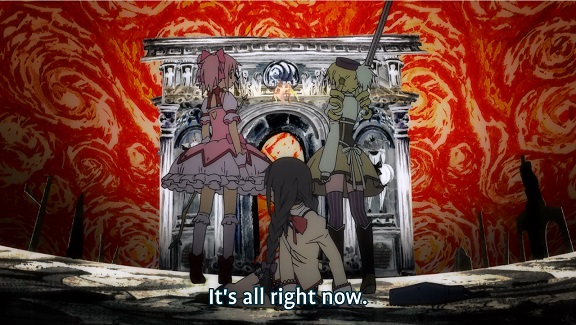
So over the holidays I had the pleasure of watching Puella Magi Madoka Magica for the first time, though it’s been on my watch list for years; ever since it first came out in fact. It’s the series that arguably made studio Shaft’s reputation, a deconstruction of the Magical Girl/Mahou Shoujo story, with its elementary or middle school heroines getting magical powers from dubious alien mascots to fight ill defined evils — after first having gone through a lengthy transformation sequence of course. Call it the genre’s Watchmen, if you’re looking for a lazy comparison. Because it’s best watched without knowing quite what you’re in for, I won’t talk about the plot here, but I found it interesting to compare Madoka to another Mahou Shoujo series, one that came out a few years after it. There will be some spoilers once we get to the nitty gritty.
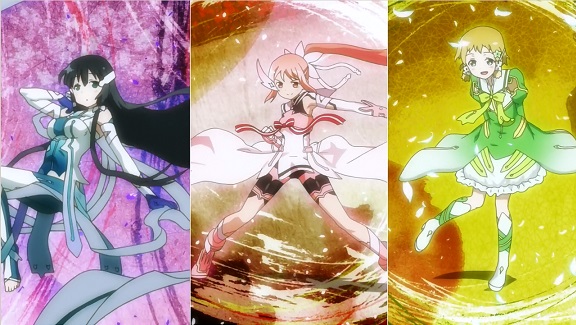
That series is Yuki Yuna wa Yusha de Aru (Yuki Yuna is a hero), which came out in 2014 and which is very much a post-Madoka Mahou Shoujo series. Like Madoka, it looks like a regular Mahou Shoujo series at first, but continually drops hints that not everything is what it seems, feeding the mistrust and suspicion of the viewer expecting a similar twist as Madoka delivered, a mistrust that only builds when the twist refuses to come (as witnessed in the relevant TV Tropes thread). Yuki Yuna remains cheerfully optimistic even as the true scale ot the threat its middle school heroines have to face becomes clear, ultimately arriving at a true happy ending.
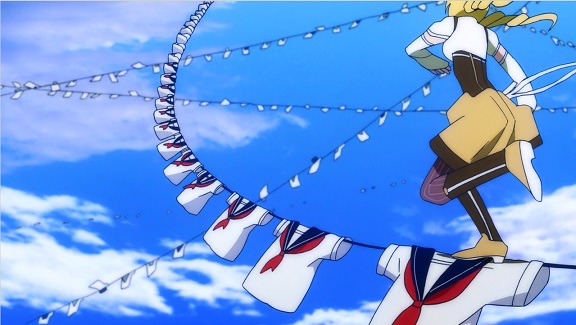
What I wondered was, if you could call Puella Magi Madoka Magica a deconstruction of the Mahou Shoujo genre, because it took a long hard look at its core premisses and asked what it would look like set in a more “realistic” world, would that make Yuki Yuna wa Yusha de Aru a reconstruction? Something similar to Astro City perhaps, which took into account the effects Watchmen had had on the superhero genre, then create a more hopeful take on it, repudiating its worldview. But mulling over it further, I thought that wasn’t quite right. Rather, it was a matter of perspective.
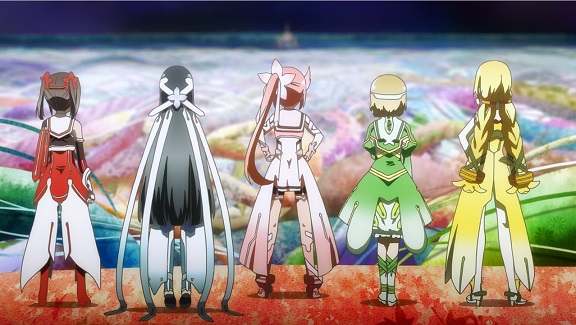
Because when it comes down to it, Madoka and Yuki Yuna tell the same story, just from a different perspective. Both take the central conciet of the Mahou Shoujo genre, of giving young girls unlimited magical powers and pointing them in the direction of a nebulous evil to fight and give it a good kicking. In both there’s a price to pay for that power, that is only revealed once it’s too late. In both the evil the girls are recruited to fight, the reason for their fight as well as the world itself are revealed to be very different from what they believed it was, with the truth being far worse than they could’ve imagined before. Both in the end even have something of a happy ending.
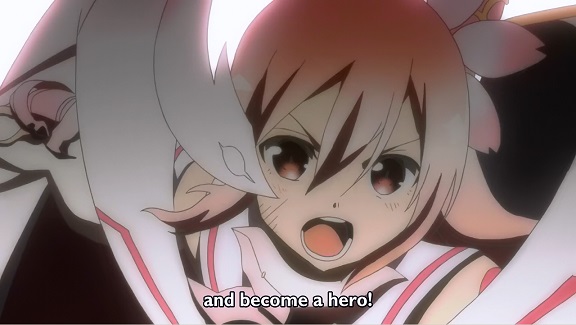
The difference is whereas Madoka quickly breaks through the angst barrier and delights in letting its characters suffer (in the best possible way), when the same happens in Yuki Yuna the characters may suffer, but their sense of optimism even in the face of overwhelming despair remains. It’s a matter of perspective; Madoka emphasised the bleakness at the heart of its story, Yuki Yuna chose to focus on the hope. Both are valid. Which one you prefer depends on your own tastes; myself I liked both.
Angel Beats! rewatch 05 – Favorite Flavor

It’s been a while since the last rewatch, apologies. Episode four had been relatively light and this episode seems to follow the same pattern, the first half being perhaps the funniest part of the whole series, before things settle down a bit for the rest of the episode. What struck me on rewatching was how well the seeds for more serious developments were shown throughout the idiocy on display in the first part. The plot is once again driven by one of Yurippe’s schemes to harass Tenshi, this time by making sure she fails her mid term exams and hence embarass her before the teachers and possibly have her sacked from the student council. In order to do so, they have to swap her real results with fakes as they’re passed to the teacher. And in order to do so undetected, the other members of the Battlefront have to provided distractions.
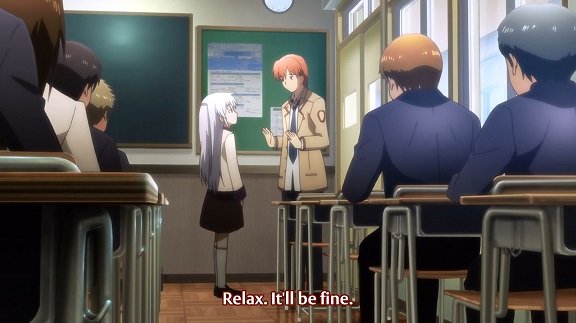
But first the Battlefront has to overcome a bigger problem: finding out what Tenshi’s real name is, as they’ve never . Which our protagonist Otonashi does by the simple expedient of talking to her — she turns out to be called Tachibana Kanade. Barring his initial approach to her all the way back in episode one that ended with her fatally stabbing him, this is actually the first time he talks to her. It’s also the first time that she’s shown as a normal girl, not a remorseless killing machine. She’s also freaking tiny, as you can see from the screenshot, as well as surprisingly friendly towards Otonashi, which makes what the Battlefront does to her all the more awful.
But also hilariously funny. The whole plot is of course ridiculous, from the idea to have her answer “I want to be a dolphin trainer” on a physics test to the lame distractions provided by the hapless Battlefront members to the frequent apologies Otonashi has to give for their behaviour. The show knows it and has tremendous fun with it, especially when yet another Battlefront member gets to fly courtesy of a Yurippe rigged rocket propelled chair set to the appropriately sad ending theme, all in glorious slo-mo…
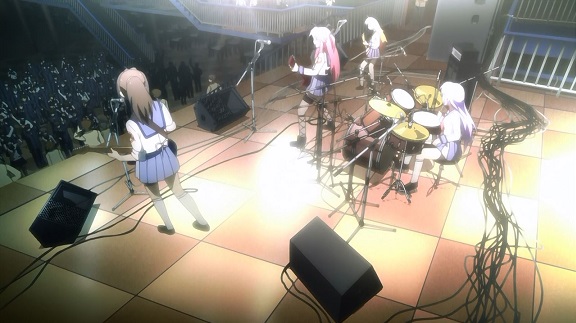
All of which gets us to the halfway mark and so far it’s been a typical Angel Beats episode, with the usual Battlefront excitement so far not bringing any response from Tenshi/Tachibana. It’s even lampshaped by Otonashi wondering if all this will actually change anything, just before it does. Thanks to their meddling with her test results, Tachibana is forced to step down as the student council president, which prompts Yurippe to start up a similar operation as the Battlefront attempted in episode one. Get GirlDeMo to do a concert as a distraction, then use huge fans to whip up enoughwind to blast meal tickets out of the attending students’ pockets.
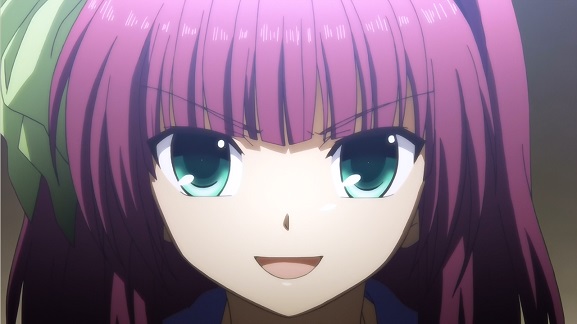
It makes me wonder what Angel Beats would’ve been like had it been a full season, twentysix episode series as originally intended, rather than the 1 cour thirteen episode series it ended up as. Would there have been more of what are arguably filler episodes like the previous one? More attention paid to the other members of the Battlefront and their stories, rather than keeping the focus mainly on Otonashi, Yurippe and Tachibana? I can’t help but think that the limited room the series ended up having was a blessing in disguise, forcing it to be tighter and more focused. Had it been longer, it might’ve lost much of its emotional impact. In any case, this episode is a turning point.
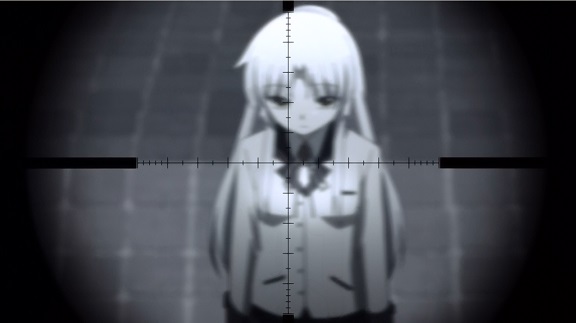
In the previous four episodes Otonashi had had Yurippe and the Battlefront members explain and show the rules of the world he’d found himself in, though he had remained somewhat skeptical even after the events of episode three seemed to prove them right. Throughout Tenshi/Tachibana had been treated as an implacable enemey; her own actions confirming she was no more than a ruthless killing machine. But when she shows up this time as Operation Tornado is in full swing, Otonashi notices she doesn’t look like her normal determined self, but down and depressed. On a hunch, he decides to call off the defence against her, letting her unhindered into the hall where the concert takes place.
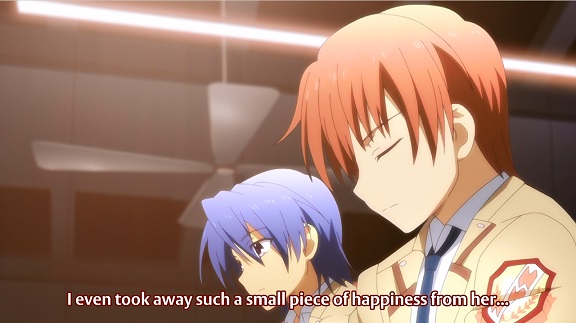
His hunch plays out. Completely ignoring the concert, she just goes to buy a lunch voucher from one of the machines, then walks back out, just as the fans start up, the voucher blowing away from her hands, to be picked up by Otonashi later. It turns out to be fro an extremely spicy but delicious mapo doufo and he realises that his actions had taken even the chance to eat her favourite meal from her. it’s with this that he finally sees her as human, not some defence mechanism the world had called into being to stop the Battlefront. This was an incredibly well set up episode, moving from comedy to pathos naturally and had it come later in the series, had there been more comedy relief episodes it wouldn’t have had the impact it has now.
Winter 2016 anime recommendations
As you know Bob, anime is broadcast in Japan according to season: winter, spring, summer & fall. Last season was the first time I made the effort to keep up with various series as they were broadcast, rather than watch them in batches afterwards. I liked it so much I’m doing the same this season. If you want to know what series are playing this season, the obligatory anichart for the season is the best way to get up to speed. I’ve watched the first episode of some tweny shows so far and of those, below are the series I’ll certainly will keep watching:
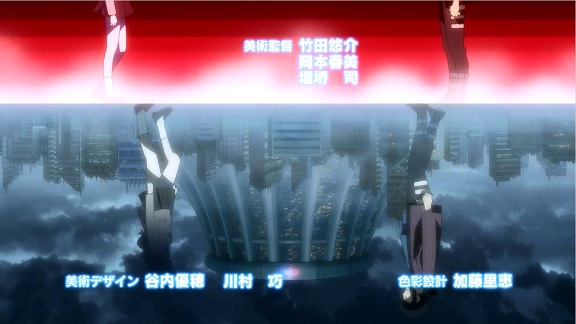
Dimension W was the series that looked the most interesting in the previews and The Gods Themselves know I like any setting that revolves around a proper science fiction concept and follows through, but the male lead came across as a jackass in the first episode so my interest has flagged a little. Will give it some time to see if it improves.

Koukaku no Pandora you could call this a lesbian magic girl cyborg show, especially with Nene’s outfit and transformation scene at the end. Cliche ridden, but an excellent example of how to do an introductionary show right and played tongue in cheek. From the guys behind Ghost in the Shell and Excel Saga.
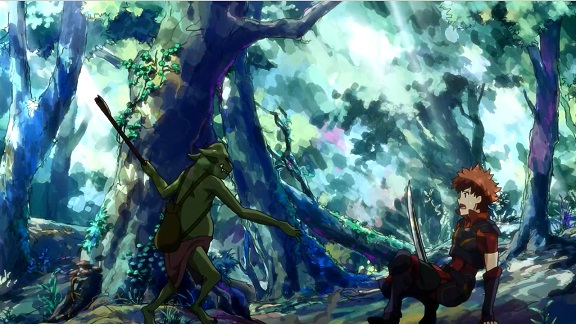
Hai to Gensou no Grimgar: another “normal kids trapped in a fantasy game world”, but this time they a) suffer from memory loss about their life before they gotten trapped, b) they’re complete noobs who have trouble even engaging with the lowest class of monsters, let alone killing them and c) it’s absolutely gorgeous with its pastel backgrounds.
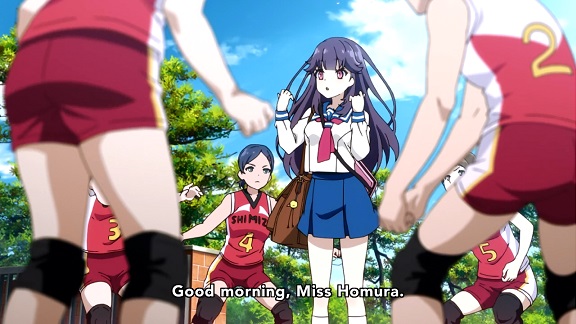
Haruchika: Haruta & Chika: P. A. Works version of Hibike Euphonium with a mild mystery sauce which I was skeptical about beforehand but turned out to be a lot better than expected. Main character being a genki girl trying to turn herself into a refined lady/cool beauty (already looking the part with the obligatory long purple hairdo) by way of switching from volleyball to playing the flute was nicely refreshing.
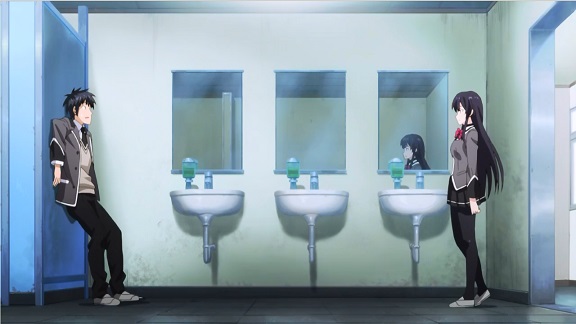
Shoujo-tachi wa Kouya o Mezasu: mostly character introduction leading up to the great revelation of what the series is going to be about: making erotic videogames. It’s mostly a collection of archetypes so far: there’s genki girl/friend of main character, side bro and of course mysterious slightly warped long black haired loner girl Kuroda driving the plot. Main character Bunta is not your average loser geek given a chance at redemption but seems well socialised and even somewhat popular in his class.
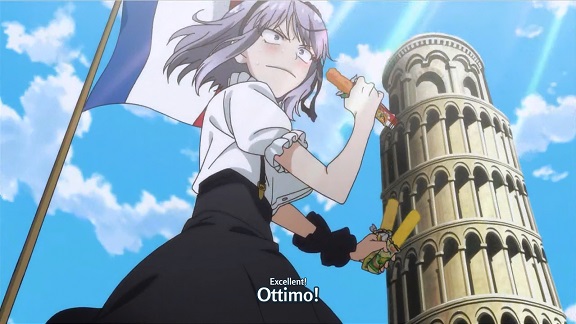
Dagashi Kashi: his father wants him to become the ninth head of the family, but he’d rather draw manga than take over the old man’s candy store. Then his dad gets an ally in the form of a crazed candy enthusiast girl (and heir to a huge candy conglomerate) who also wants him to make candy. Laugh out loud funny in places.
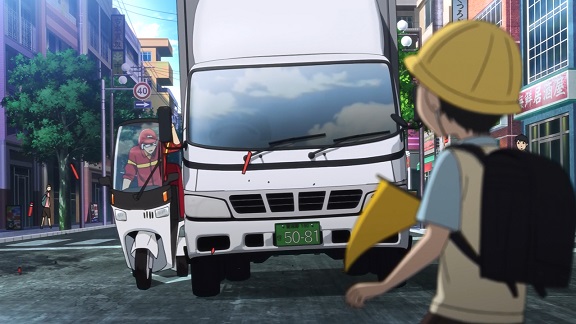
Boku Dake ga Inai Machi: failed mangaka has the involuntary power to leap backwards in time to right things that are going to go wrong, usually only a few minutes, but then something big happens. Excellently done so far and I liked the main character’s mother: how often do you actually see mothers in anime, especially mothers of grownup characters? The overall mystery is barely explained at this point but the way the first episode was build up was promising. Second best series start I’ve seen so far this season.
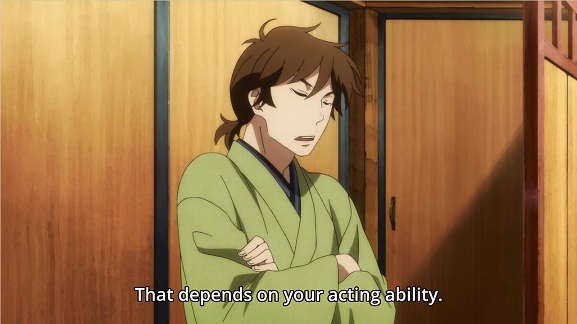
Shouwa Genroku Rakugo Shinjuu: the best series so far this season, about a fresh faced ex-prisoner who begs a rakugo storyteller who he’d seen perform in jail to take him on as an apprentice. I had no idea what to expect from this, knowing nothing about rakugo before I started watching this, but it was oddly compelling. It’s hard to make what’s essentially a static artform look interesting in animation, not to mention getting the nuances right, but it succeeded for me and the show has to courage to feature full performance, not excerpts. The first episode was a double length one but never lost my attention.
Small differences matter
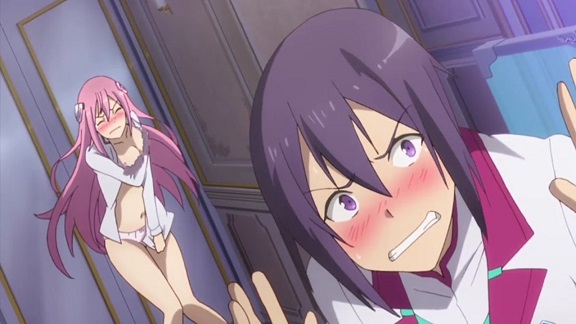
In Gakusen Toshi Asterisk, the protagonist is Ayato, a dark haired boy going to magic school to fight and win its annual fighting tournament for reasons. Due to circumstances, he ends up walking in upon a half naked, flame wielding pink haired tsundere girl, Julis, who calls him out for a duel to restore her honour. They fight, he wins, stuff happens and they fall in love while working towards the tournament together.
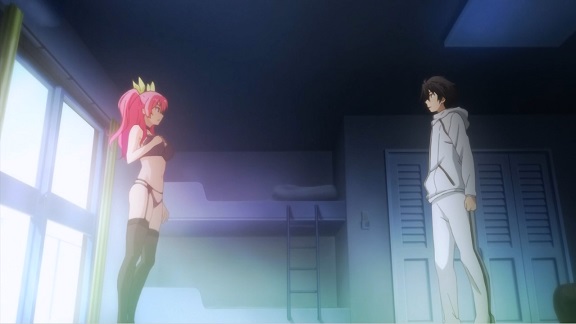
In Rakudai Kishi No Cavalry, the protagonist is Ikki, a dark haired boy going to magic school to fight and win its annual fighting tournament for reasons. Due to circumstances, he ends up walking in upon a half naked, flame wielding red haired tsundere girl, Stella, who calls him out for a duel to restore her honour. They fight, he wins, stuff happens and they fall in love while working towards the tournament together. Wait, where did I hear this before?
Yes, these two series, both of which were aired during the Fall 2015 anime season, at first glance look so similar it’s possible to set the ending theme of the first to a scene from the second and not look out of place. They’re so similar that even where they break from cliche, in resolving the sexual tension between the male and female lead, they do it in a similar way. A cynical person would explain this similarity by noting both are adaptions from a light novel series, light novels of this type being notoriously rife with cliches. Aimed at younger readers, they’re sort of a cross between fan fiction, illustrated stories and young adult fiction, with many of the faults of these media. Over the past decade or so they’ve become an important source for anime adaptations and every season has at least one fantasy/sci-fi light novel adaption starring a bland dark haired guy, usually teamed up with a red haired tsundere and one or more other potential hair colour coded love interests.
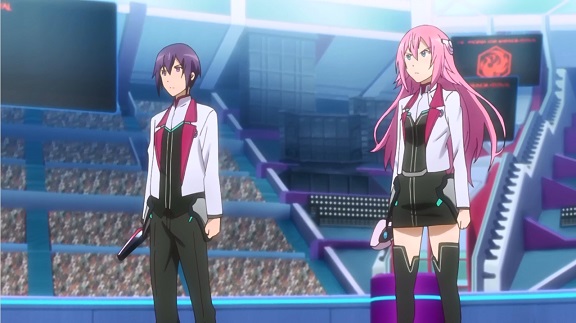
But there’s one small difference between the two series. In Rakudai Kishi No Cavalry the tournament is based around solo fights, which each participant having to fight their way towards the final alone, but in Gakusen Toshi Asterisk the fights are based around two person teams. A small difference, but it matters a lot for how its show treats its love interests. In Cavalry, Stella’s fights are never shown as the focus is squarely on how Ikki progresses; because in Asterisk Ayato and Julis are a proper team, she gets to do a lot more. She’s much less of a damsel in distress or trophy than Stella gets to be in the later half of Cavalry, more of an equal partner, making Asterisk ultimately the better series of the two.
(Post expanded from this comment over at Fantastic Memes.)